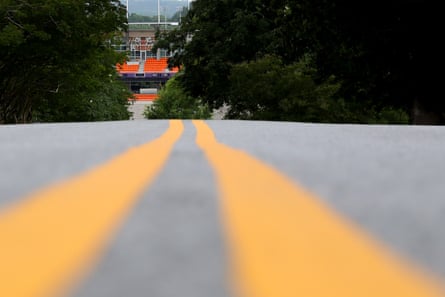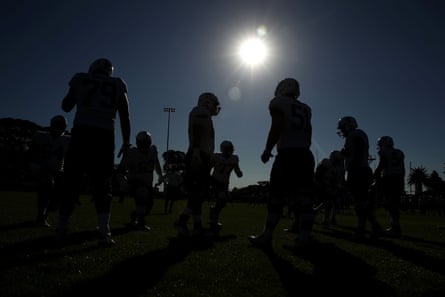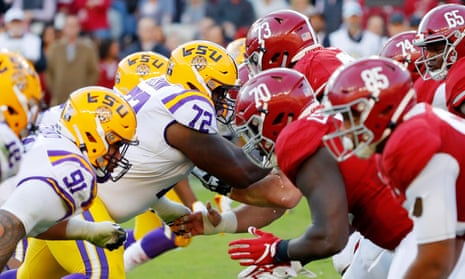“We’re just out here getting gaslit en masse by our university.”
That’s how a college football player who reached out to the Guardian summarized the experience he and his teammates are enduring at a Power Five school as it prepares to kick off the 2020 season in a few weeks’ time.
By now, you’ve probably heard some version of the story. Face to face, everything has been avoided like, well, the plague, at universities across the US this summer. But college athletes, particularly football players, have been expected to be on campus participating in workouts amid a coronavirus pandemic that has killed nearly 155,000 people in the US.
Even the vaunted Southeastern Conference has admitted behind closed doors that it cannot protect players from Covid-19. As one unidentified SEC official told player representatives on a private call: “We’re going to have cases on every single team in the SEC. That’s a given. And we can’t prevent it.”
There has been an increasing groundswell of condemnation for the prospect of going through with a season in public discourse. But absent from that discussion, for the most part, have been the voices of the athletes themselves.
That’s a shame. Not only have athletes’ voices historically been excluded and silenced at US universities, in truth their very capacity for autonomy has been strictly regulated. Perhaps the silver lining to the atrocity of this summer of harm, then, has been the incredible burgeoning resistance movement from college athletes who are seizing power and speaking out against a system that has long denied their voices.
For those paying attention, the signs of a sea change in athletes’ willingness to speak up against their institutions have been hard to miss. In June, 30 players from the UCLA football team sent a powerful letter to the university chafing at how from “neglected and mismanaged injury cases, to a now mismanaged Covid-19 pandemic, our voices have been continuously muffled” by the university.
In response, they declared, “We as a football community assert our right to protect, preserve, and make decisions with regard to our own personal health and safety and now demand that we are able to do so without consequence in terms of reduction, or cancellation of scholarship benefits, or retaliation from coaches and faculty in any shape or form.”
In order to enforce these freedoms, players demanded “third-party health officials in charge of overseeing and enforcing health and safety guidelines,” “whistleblower protections provided for athletes and staff”, and the “ability to make decisions with regard to personal health without consequences in terms of loss of scholarship or retaliation from coaches in any form”.
But UCLA is not the only place this pushback is happening. Earlier this month, former Arizona State quarterback Rudy Carpenter tweeted that there was a movement afoot at every member school of the Pac-12 Conference – led by University of California, Berkeley – demanding a “50/50 rev share, 6 yrs insurance upon graduation, better Covid-19 testing & protocols etc” or they are “threatening to sit out the season”.
And indeed, on Saturday evening it was revealed that players across the Pac-12 were planning to deliver demands to the league on Monday. That organization, known as Pac-12 Football Unity, planned to boycott all “fall camps and football games” until they receive a “written contract with the Pac-12 that legally ensures [they] are offered “safe play during Covid-19”, assurances against “racial injustice”, “economic rights & fair compensation”, protection for “all sports”, and “long-term health insurance”.
Likewise, after the entire Michigan State football program suspended activities and was placed in quarantine following positive test results, offensive lineman Jordan Reid tweeted, “Guys are testing positive across the country left and right...why is there still discussion on a season? Why is it taking so long to make a logical decision? Hmm let me guess REVENUE.” Reid’s understandable frustration echoed comments from Ramogi Huma, founder and president of National College Players Association, in USA Today reporting about what he had been hearing from “more than two dozen football players upset about how Covid-19 testing is being handled by their respective schools.”
Huma told the paper: “These players I’m talking to are really angry. They are truly, genuinely angry. They’re realizing, from their mouth, they’re saying, ‘Our program doesn’t care about us.’” This was confirmed by an anonymous player who had told USA Today that he “is one of 20 to 25 players at his school who are talking about refusing to play this season because of Covid-19 concerns. I’m not out here just acting like everything’s normal when it’s not.”
These athletes are not alone. Players the Guardian spoke with expressed a range of significant concerns about ongoing college football activities.

One student-athlete from a school in college football’s Power Five, who like all players interviewed for this story asked to remain anonymous for fear of reprisals from their programs, told us that concerns began right from the start of the pandemic.
“When everything first was shut down and cancelled, we were actually going to have like a team workout,” he said. “And they told us we were going to try and have a spring ball practice that day even though we weren’t supposed to practice for like I think a week after that.”
That player did make it clear players on his team were informed if they chose not to practice “it’s not going to be held against you,” but, he said, “people kind of didn’t really trust that”.
“If there was organized and mandatory football events going on and they held out because of fears of Covid-19 that there would be no repercussions … in terms of losing reps, losing playing time, things of that nature,” he said.
Another player from a Power Five school who did opt out was made into an example by his coaches. As he put it, after opting out of the season: “I am not allowed to be involved in any team activities. I was told that I should clean my locker out. Coaches just showed their true colors.”
For another Power Five player, the situation was even more explicitly coercive. Around May, he recalls being told in a meeting by a coach that if he didn’t “consent to be a participant in an ongoing study” that “we would be setback as individuals for what could be weeks, a setback which they directly said could affect our playing time”. Players on his team were also instructed to sign “a waiver that freed the university of any liability from a wide variety of things, including the loss of our own life.”
“[We] were told things were voluntary, but things were framed in a way that felt manipulative,” he said. “They specifically asked us if we wanted to play football, as well as other things in the same vein. Throughout the process my teammates and I have joked about how false this whole voluntary pretense feels.”
One such waiver that we viewed begins with the statement that the university in question is unable to ensure that team members will not be infected with Covid-19 during football activities. The waiver then states that participation in football activities is “voluntary”, before suggesting that it will “potentially” expose players to Covid-19. After asserting that football activities very well might lead to the contraction of the virus, the waiver asks players to “release from fault” any employees or agents of the university for injury and illness including death that occurs as a consequence of contracting the virus from football activities.
When it comes to health protocols, the player who shared this waiver articulated significant concern, particularly after there was confirmation of positive testing. In the face of the imminent threat of the virus, he said of himself and his teammates: “We feel like our protocols are inadequate, and that they don’t properly protect us. … We are in communication with athletes at schools in our conference as well as in other Power Five conferences, and every university seems to be following different guidelines.
“One specific problem that we have with current policies, is the apparent scarcity of testing. We have not been tested since first arriving on campus. It’s been almost two months since then. After our first positive case, many members of our team requested to be tested. In response they were asked if they had any symptoms, and if not their requests were ignored. This is all incredibly alarming given the rate of asymptomatic carriers being as high as 40% as reported by some studies. We are not happy.”

Another player revealed that the issue of eligibility is particularly weighing on the minds of players considering whether to opt out of the season. Although publicly there is the assumption that players can retain scholarships, this does not mean that they necessarily retain future eligibility. This is particularly relevant with respect to the issue of redshirts. When players directly asked coaches for assurances that they could get an additional year of eligibility if they sat out despite having already redshirted, they were told that no such assurances could be provided. In effect, this policy forces players in this situation to take the field, as it is their last shot to impress professional scouts.
Similar concerns were echoed by another Power Five player, who said: “It’s laughable to many of us that anyone could expect a lack of backlash if you were to sit out… if a coach wants to, they can find ways to push players out of the program. Even if you were planning to transfer afterwards, you have to ask yourself how coaches at other universities might view you. You risk being blackballed as a player. Everybody knows everybody in the coaching industry, and all it takes is one call for your chances to be ruined at a potential program [unless you’re a star].”
Despite these reservations and following what appears to be a trend in the National Football League, we have seen a number of college athletes opt out of the upcoming season citing the unknown risks that Covid-19 presents to their health. And while NFL players leave money on the table, college athletic laborers are left with uncertainty regarding their scholarships and their athletic futures. There is so much uncertainty for college football players that on a least some teams they were not even told when the opt-out deadline would be.
In fact, at least one player we spoke with found that his coaches violated “a bunch of the protocols and testing standards we expected when we came”. After having his concerns ignored and downplayed, that player elected to “boycott” workouts and was planning to opt out of the season.
The pandemic has only underscored the broader problem of compensation in college sports – and the structural iniquities of a billion-dollar industry that runs on the backs of unpaid labor.
“We genuinely feel like we need to be compensated,” one player told us. “Allow athletes to share in the revenue. If you don’t want to directly pay us then set up a trust or something for after we graduate. I think college football, an ‘amateur sport’, being brought on campus faster than professional sports were allowed back at their facilities, is a major red flag.”
Conditions have become so extreme, he said, that a number of his teammates have come together to contemplate labor action.
“There have been talks of boycotting or striking,” he said. “I don’t think anyone else will actually do anything, though, because of the power dynamics inherent in college football as we know it today. We don’t feel safe actually doing anything, because at the end of the day who is going to support us or protect us? It seems that everyone in charge of us is in the process of circling the wagons, and the priority of coaches and administration has been set on protecting the program, not student athletes.”
It is clear, then, that the remarkable explosion of resistance from campus athletic workers taking place right now is in part a function of desperation in the face of unprecedented and terrifying circumstances. And let’s not forget, these young workers have already been harmed by universities asking them to return for practices that by any reasonable measure should have already been cancelled.
The simple fact is that we have no idea about the long-term effect of Covid-19 on the body, regardless of age.
“Why are people having this power over us, and why aren’t they being checked?” one player said. “I’m honestly the most stressed out that I’ve been in my life. I have a teammate [near] me who has tested positive and has complained to me about how much his lungs hurt. This is coming from an incredibly fit, athletic guy with six-pack abs. He told me verbatim, that ‘there is no way I could go through a whole practice much less a game within three weeks. This shit breaks down your body.’”
Then he provided his most evocative testimony of all.
He said, “We need help.”
Nathan Kalman-Lamb, Derek Silva, and Johanna Mellis are co-hosts of The End of Sport podcast
